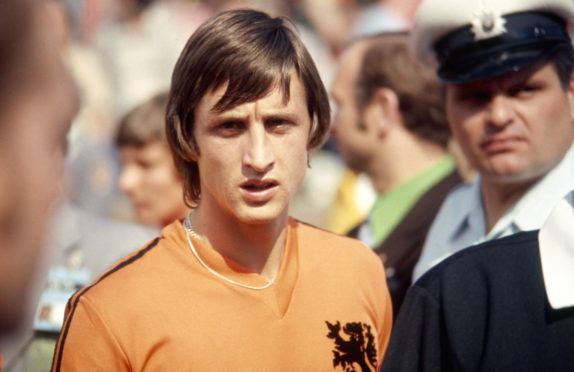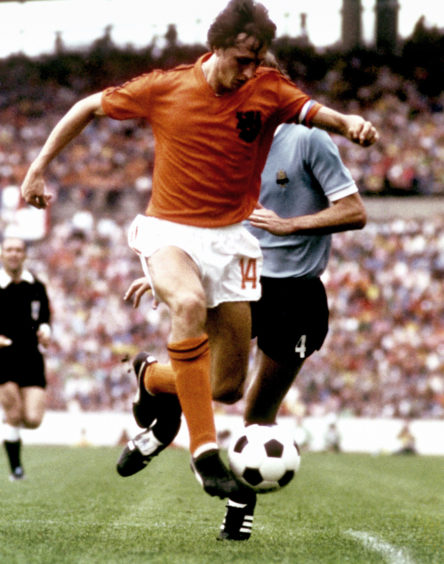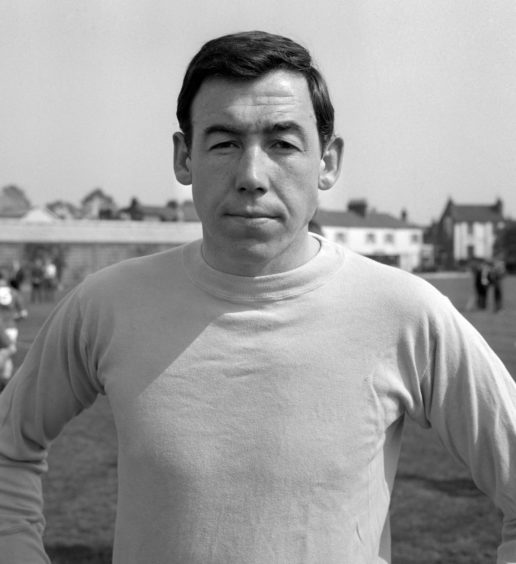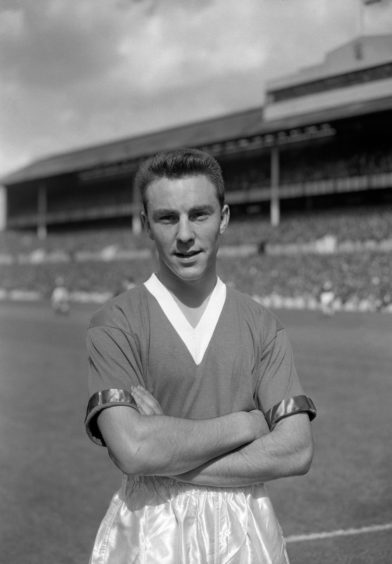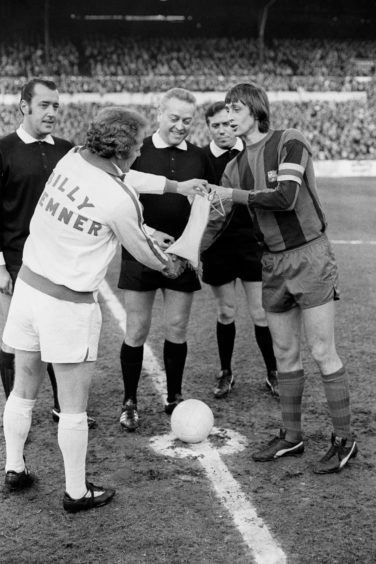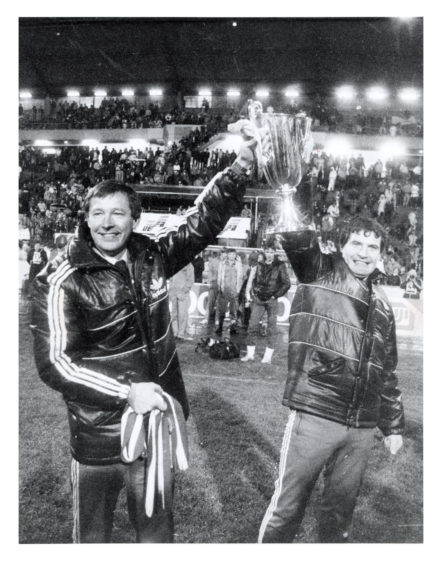Perhaps the greatest-ever European player, Johan Cruyff would help transform the way football was played.
Cruyff was the epitome of Total Football and won three Ballon d’Or awards during his playing career which spanned two decades.
But it is little known that he almost pulled on an Aberdeen shirt under Alex Ferguson.
The Dutch master, who become synonymous with the number 14 shirt, was playing for Los Angeles Aztecs when he agreed to be a guest player in a four-team tournament in Malta involving Aberdeen, Stoke City, Leicester City and the Maltese international team.
England World Cup winning heroes Gordon Banks and Jimmy Greaves also agreed to take part as guests in the three-day Paro International Cup which was due to take place in December 1979.
Sir Stanley Matthews, who still lived on the island after moving to coach the Maltese side Hibernians in the early 1970s, was also set to pull on a shirt and play for Malta.
The tournament was being staged by the Maltese FA to officially open a new pitch and Aberdeen fans also booked a seven-day holiday package to watch the tournament.
“Cruyff will pull on an Aberdeen shirt and line up in the Dons attack,” said Ferguson.
“He will be just one of three guest players who will take part in a four-team tournament in Malta from December 8 to 13.
“The other two are Gordon Banks and Jimmy Greaves, the former England internationals, and each one will play for the Dons at some time during the tournament.
“The tournament takes place immediately after the League Cup Final so with a little luck we could be going over there to celebrate.
“But whatever happens, the Malta trip will provide an excellent break for the players during what could be another cold hard winter’s football.
“Three games in the sunshine should tone the players up and the fact that Aberdeen fans are also being given the chance to join us in Malta should make it an enjoyable trip.
“The object of the tournament is to provide the soccer-mad Maltese with some good British football.
“And with Cruyff, Greaves and Banks in the line-up there will be plenty for the fans to enjoy.
“And think what a boost it will be to our players to have the great Cruyff in our dressing room pulling on a Dons jersey?
“And I’ll achieve an ambition by telling him how to play football…Aberdeen-style that is.”
But just 10 days before they were due to fly out to the Mediterranean the tournament was cancelled.
The Maltese government and the Maltese FA were involved in a squabble as to who should pick their international side.
“This has come as a big shock at such short notice…both to the players and the fans who were booked up for a trip to watch us,” said Ferguson.
“The club and supporters have been advised that the tournament has been called off because of an internal row.
“However I hope to find some alternative as the players had all been looking forward to the trip.”
Aberdeen put the disappointment behind them and went on to win the league title which was the catalyst for the glory-laden decade that followed.
Cruyff never did pull on a Dons shirt alongside Joe Harper and Steve Archibald but he almost did play for a British team when he nearly signed for Leicester City in 1981 at the age of 33.
Foxes manager Jock Wallace thought Cruyff would be the ideal signing to keep them in the First Division where they were facing relegation and languishing in 22nd place.
#DeadlineDay "Johan Cruyff is set for a sensational move to Leicester City" 1981 #TransfersThatNeverHappened pic.twitter.com/fqvbLUEwTf
— The Antique Football (@AntiqueFootball) August 31, 2015
Negotiations lasted three weeks, and Cruyff expressed a desire to play for the Filbert Street side, and get first team action in a top European league ahead of the 1982 World Cup.
A deal could not be reached and Cruyff instead chose to sign with Spanish Segunda División side Levante instead of gracing the East Midlands with his talent.
Leicester went on to be relegated, finishing 21st in the division, while Cruyff only ever played 10 times for Levante, before returning to Ajax.
The Dutch legend’s name still lives on in Aberdeen following his death in 2016 after a community sports facility was named after him.
There are almost 200 Cruyff Courts in more than 15 countries around the world.
The master of Total Football
Johan Cruyff’s father died of a heart attack when he was 12, two years after he had joined the youth system at Ajax where his mother worked as a cleaner.
He excelled in the club’s baseball section but at 15, he began to focus on his football.
Cruyff made his professional debut on November 15 1964 aged 17 when he played for Ajax against GVAV in the Dutch League.
Ajax lost 3-1, but the newcomer scored the consolation goal.
A couple of months after making his first-team debut, Cruyff met former PE teacher Rinus Michels and together, the pair invented what’s known as Total Football.
The idea was that every player on the pitch could play in multiple positions and therefore interchange with team-mates.
Cruyff was the man who made it work.
The following season, he scored 25 times in 23 games and Ajax finished as champions.
By the time he left Amsterdam for Barcelona in 1973 for a world record fee, Cruyff had won 16 major honours, including three successive European Cups.
He went on to help the club to win La Liga for the first time since 1960, defeating Real Madrid 5-0 at the Bernabeu in the process.
The year after he moved to Spain, Cruyff’s influence took the Holland team to the World Cup Final in West Germany, where he was named player of the tournament.
He is one of the few players ever to have had a specific on-field move named after him — the Cruyff Turn.
In a World Cup group game against Sweden, with his back to goal, Cruyff feigned a pass before dragging the ball back and turning 180 degrees to beat his defender.
With that swift movement, the most iconic skill move in history was born.
He retired from international football the year before the 1978 World Cup having won 50 caps and scored 33 goals.
He moved from Barca to the USA, where he played for Los Angeles Aztecs and Washington Diplomats before a brief return to Spain with Levante and three final seasons with Ajax and Feyenoord.
Cruyff returned to Ajax as manager in 1985 and Barcelona three years later.
There he set in place the principles that were to revolutionise the club, not just in the senior side — which became known as the Dream Team — but throughout the age groups, with every level playing in the same attractive, Cruyff-style way.
Cruyff won four league titles, a UEFA Cup and the Champions League at Barcelona, with a style of football which would go on to be used by all Nou Camp coaches.
“All the people thinking about the best manager by talking about how many prizes or titles you’ve got, that is a huge mistake,” said Manchester City manager Pep Guardiola, who played under Cruyff at Barcelona, before also managing the team.
“It matters how they influence a new generation and their players.
“The influence of Johan is outstanding, amazing, huge.
“We tried to follow what he taught us.
“It was a masterclass every single training session, every single game.
“It was like going to the university every single day.
“Johan was the most influential person in football history.”
Cruyff died at the age of 68 in 2016.
